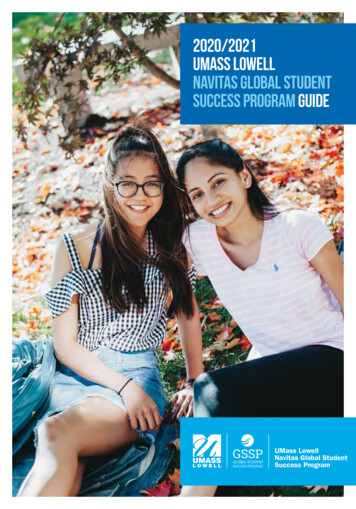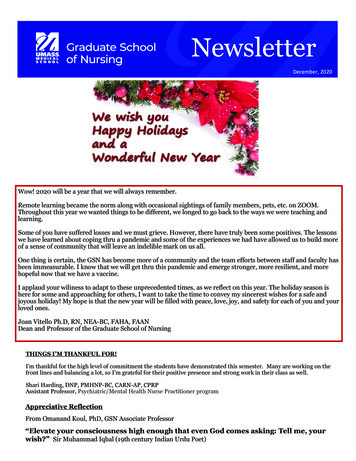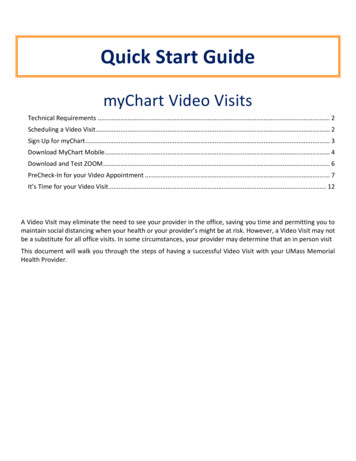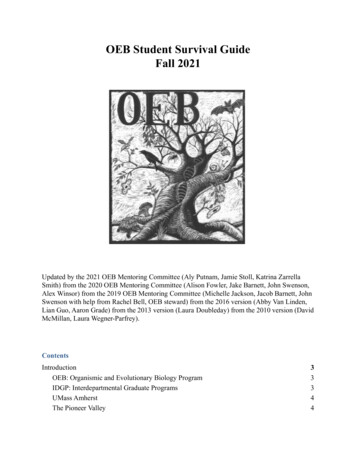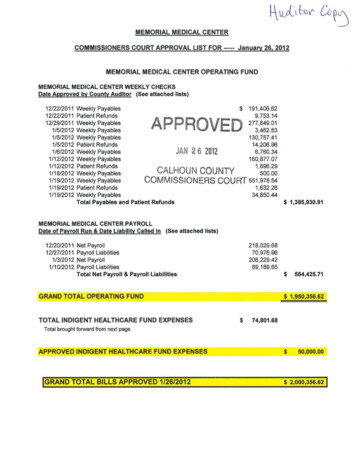
Transcription
UMASS MEMORIAL MEDICAL CENTER2015 ANNUAL REPORT OF THE CANCER COMMITTEE
Table of ContentsA Far-reaching Network of Community Cancer Care.2Focusing on the Personal in Personalized Medicine . 3Intraperitoneal (IP) Chemotherapy: “One of the greatest clinical advances for treatingovarian cancer” available at UMass Memorial’s Cancer Center . 4Intraperitoneal (IP) Chemotherapy Patient StoriesSusan Briody: “I cannot say enough .” . 5Sheila Burque: “I never gave a thought to going to Boston.” . 6NAPBC Awards Prestigious Three-Year, Full Accreditation to UMass MemorialComprehensive Breast Center . 7Development of Personalized Cancer Treatment: Advances in diagnostic molecularoncology help physicians provide “right amount of treatment” . . . 8Open Clinical Trials . 9Landmark MATCH Clinical Trial at UMass Memorial: “Precision medicine meets personalized care” . 10Palliative Care Program: “Stronger, More Accessible to Cancer Patients Than Ever” . . 11National Accreditations and Recognition . 132013 Quality Measures . 14About the Art . 19A Far-reaching Network of Community Cancer CareUMass Memorial Health Care offers a broad-reaching network of cancer care in the MetroWest andCentral Massachusetts communities. It is our goal is to provide our patients with expert, personalized,patient-centered, high-value cancer care and services in a location that is close to home.Our Community Hospitals:At UMass Memorial – Marlborough Hospital, we offer our patients convenient, compassionatecancer care close to home, in a new patient-focused facility. Here you will find infusion services andradiation therapy featuring the latest 4-D imaging. A team approach to your treatment features multidisciplinary care from many specialists, plus access to some of the most promising clinical trials andresearch studies, and links to specialized cancer programs such as genetic testing, bone marrowtransplant, surgical oncology and more.At UMass Memorial – HealthAlliance Hospital, the Simonds-Sinon Cancer Center offerscomprehensive, personalized cancer care locally. With services such as medical oncology, radiationtherapy featuring the True Beam patient system, a complementary care center with mind-bodyinterventions such as Reiki and massage therapy, a patient navigator program, plus access to moreadvanced treatments and clinical trials, the Simonds-Sinon Cancer Center is a beacon of hope forresidents in the greater North Central Massachusetts region. The center has achieved accreditationfrom the American College of Surgeons Commission on Cancer and is designated as a CommunityCancer Program.
Focusing on the Personal in Personalized MedicineBy Alan G. Rosmarin, MD, Chair, Cancer CommitteeIt seems that every day wehear about remarkableadvances in the diagnosisand treatment of cancer.We’re filled with wonderas we learn of PersonalizedMedicine and its advancedmolecular studies andmore effective, targetedtherapies. But who is everfully prepared to hearthose dreaded words:“You have cancer.” Suddenly, your world is turnedtopsy-turvy, as you wrestle with physical, emotionaland even spiritual challenges. Of course, you’re thesame person that you were before your diagnosis,but it may seem that all attention turns to managingthis disease.the chief of the Division of Gynecologic Oncology,and her colleagues.The UMass Memorial Laboratory of DiagnosticMolecular Oncology, led by Lloyd Hutchinson, PhD,routinely performs DNA sequencing on a variety ofcancers. Mutation profiling of patients’ cancers canprovide new opportunities to target the underlyingmolecular defects that drive the cancer process.We will learn how these advanced techniquescan distinguish differences in cancers that eventhe microscope cannot reveal, and lead to moresuccessful therapy. We also will read about theMATCH program – a series of individualized clinicaltrials based on the ability to identify specific genemutations in the patient’s cancer. UMass Memorial isproud to participate in this nationwide effort to bringadvanced, individualized cancer care to people in ourregion and beyond.Naturally, at such a time we want the most skilledpractitioners, advanced diagnostic techniques, andmost effective treatments. But we also want caringand compassionate clinicians – supporting us withtheir healing hands and sharp minds – and a warm,welcoming environment that puts the patient at thecenter of decision-making and care.There are times when even the most-advancedtreatments cannot halt the progress of cancer. At suchtimes attention turns to managing symptoms, ratherthan treating the cancer itself. The multidisciplinaryPalliative Care team at UMass Memorial providessensitive and personalized healing, and integrates itwith the services of other caregivers.In this Annual Report, we will read about cancer careat the UMass Memorial Cancer Center. Together,these stories describe our state-of-the-art approachto cancer care, yet emphasize that it is the affectedindividual and loved ones who are the focus of ourhealing efforts.Recently, the National Accreditation Program forBreast Centers (NAPBC) bestowed a Three-Year FullAccreditation to our Comprehensive Breast Center –the only facility in Central Massachusetts to earn thisaward. They recognized that our ”outstanding breastprogram with strong leadership and institutionalsupport . adheres closely to national guidelinesproviding high-quality, patient-centered care.”This recognition highlights the multidisciplinary,individualized, and sensitive approach to cancer carethat we provide at UMass Memorial.In the summer of 2015, the New York Times includedstories about the underutilization of intraperitoneal(IP) chemotherapy for ovarian cancer and othertumors that affect the abdominal cavity. Even thoughIP chemotherapy is an important clinical advance forthese diseases, it is not widely available. However,the UMass Memorial Cancer Center has beenutilizing this approach to extend and improve thelives of hundreds of women since 1998. Indeed,UMass Memorial was the first hospital in the stateto adopt this approach, and it remains the onlyhospital in Central Massachusetts that offers thisspecialized service.We at the UMass Memorial Cancer Center are proudto offer the most-advanced Personalized Medicine,while never forgetting that it is the person affectedby cancer who is at the center of all that we do.Dr. Rosmarin is the Gladys Smith Martin Professor ofOncology of the University of Massachusetts MedicalSchool, and chief, Division of Hematology/Oncology,co-director, Cancer Center of Excellence, of UMassMemorial Health Care, and chair, Cancer Committee,of UMass Memorial Medical Center.We will read two touching stories from womenwho required advanced therapies for their ovariancancers, and how they were healed by the exceptionaltechnical skill and warm heart of Susan Zweizig, MD,3
“One of greatest clinical advances for treating ovarian cancer”available at the UMass Memorial Cancer Center“This is standard treatment that we offer to everywoman who is eligible,” says Susan Zweizig,MD, director of the UMass Memorial Division ofGynecologic Oncology. “But not everyone withovarian cancer is eligible,” she adds, noting that apatient’s age, general health and vitality, and theseverity of her cancer must be considered.“IP chemotherapy is approved for stage 2 and 3ovarian cancer in patients who have had optimaltumor removal, and it can be very toxic,” Dr. Zweizigexplains. “But if someone is a good candidate, weexplain the risks and benefits and what it could meanfor her. And she makes the decision.”Based on a 2006 study (in which UMass Memorialparticipated), patients receiving IP chemotherapysaw a 15-month survival improvement versus thosewho received intravenous (IV) chemotherapy alone.Susan Zweizig, MD, director of the UMass MemorialDivision of Gynecologic Oncology, provides specializedIP chemotherapy to ovarian cancer patients.“Our experience continues to echo these results,”Dr. Zweizig says. “Yes, there are exceptions, but wealso have many long-term survivors.” (Please seerelated stories.)In an August 12, 2015, letter to the New York Times,the CEOs of the Ovarian Cancer Research Fundand the Ovarian Cancer National Alliance calledintraperitoneal (IP) chemotherapy “one of the greatestclinical advances to date for treating ovarian cancer.”Dr. Zweizig believes that patient education playsa key role in UMass Memorial’s overall very goodpatient outcomes.Notably, this important treatment is available at theUMass Memorial Cancer Center – and has been since1998 – extending survival in hundreds of womenfor whom this therapeutic approach has been anoption. In fact, UMass Memorial not only was oneof the first in the state to adopt this life-extendingtreatment, but remains the only hospital in CentralMassachusetts to offer it.“Our nurses educate patients fully so they knowexactly what’s happening,” she says. “It’s not themost pleasant treatment, but patients generallytolerate it well, and education is a big part of that.”She also notes that many patients and physiciansbelieve that when it comes to treating ovarian cancer,the best person to administer chemotherapy is thephysician who also performs the surgery to removethe tumor – an integrated gynecologic oncology caremodel that is the standard at UMass Memorial.In IP chemotherapy, warmed, highly concentratedcancer-killing drugs are pumped directly into theabdomen via a port. Patients are then rolled back andforth on a bed, sloshing the chemotherapy aroundso it bathes any cancer cells that may remain aftertumor-reduction surgery. Most patients receive sixrounds of IP chemotherapy in addition to intravenouschemotherapy.“Having done this here for 21 years, I totally agree,”she says. “Our team of four gynecologic oncologistsis extremely well-versed in this treatment. And thesurvival benefit has been made clear.”4
Susan Briody’s Experience with IP Chemotherapy:“I cannot say enough .”Susan Briody was 54 when she began having whatshe described as occasional gastrointestinal distress.“I had no hesitation about doing it,” Briody says.“She said it would be difficult and I might feel verysick from it, but I had no fear.”“I’d flown to Arizona to visit my college roommateand I just felt awful,” the Charlton resident relates.“It felt like the worst constipation, but it wasn’tthat. I didn’t feel like eating and just couldn’t getcomfortable. My roommate made me promise I’dsee my doctor when I got home.”Briody underwent the full six cycles of IP chemotherapyover a four-month period, taking a powerful antiemeticto prevent nausea.“After four cycles of IP chemo, Dr. Zweizig said Iwas doing great, but said there was a risk I couldget neuropathy in my hands and feet if I continued,”Briody says. “I’m an artist and was an art teacher, soshe was concerned about that.Briody had a routine annual visit – albeit about sixmonths late – already scheduled with Alan Albert, MD,the ob-gyn who’d been her primary care physician fordecades. She didn’t mention her symptoms to him,however, dismissing them as constipation.“I asked her if my chances of survival woulddramatically improve if I did all six treatments andshe said yes,” Briody adds. “I said I’d rather be anartist who can’t feel her hands and feet than a deadone.”“But he ordered an ultrasound that showed whathe said could be fibroids, and he referred me to agynecologic oncologist he trusted,” she says.“Well, the hair on my neck curled and my face turnedred when I heard ‘oncologist,’” Briody continues.“But he explained that the surgeries he does areobstetrical, and that Susan Zweizig, MD, was theright person for me to see.”Briody says it took a full six months for her to feelbetter after treatment, but it’s been smooth sailingever since. She has been cancer-free for 8½ years.“I thank my lucky stars every day,” she says. “It’stoo bad you have to have a life-threatening eventto learn to live in the present and not take anythingfor granted. I cannot say enough to appropriatelythank or describe what Dr. Zweizig and the UMassMemorial team have done for me and my family.They are just the best.”Briody underwent additional tests, including a CTscan and blood work that revealed her CA 125, atumor marker for ovarian cancer, was 8,000. Thenormal range is 14 to 20. She saw Dr. Zweizig ona Tuesday to review her test results; surgery wasscheduled for 48 hours later.“I had all the attributes of cancer,” Briody says, “butit wouldn’t be definite until they sent a biopsy to thelab during surgery.”The diagnosis became definite, and Briody’s surgerybecame more extensive.“They did debulking surgery to take out anythingsuspicious,” she relates. “I had a completehysterectomy, they removed my appendix since it canharbor cancer cells, a layer of fat in my abdomen,they scraped organs to remove anything that lookedlike it could harbor ‘floaters,’ and they removed tenlymph nodes. When I woke up, I was told I had stage3 ovarian cancer.”Soon thereafter, Dr. Zweizig discussed IP chemotherapy with Briody.A gifted artist who shares her talent with others, SusanBriody has been cancer free for more than eight years.5
Sheila Burque’s Experience with IP Chemotherapy:“I never gave a thought to going to Boston.”It was probably the worst birthday of her life. In thesummer of 2012, Sheila Burque – an administrativeassistant in the Surgical Oncology Department at theUMass Memorial Cancer Center – was about to turn56 when, a few days before the event, she felt a lumpin her belly button.“That was on a Thursday,” she recalls. “Then over theweekend I started to get bloated until I looked like Iwas nine months pregnant. It happened so quickly,and it was very scary.“I called my primary care physician, DemosthenesAgiomavritis, MD, that Monday morning and saidthat my belly was hard and distended,” she continues.“He saw me at 10:15 and had me wait in the officewhile they arranged an urgent CT scan the same day.”Prior to her sudden, severe bloating, Burque hadexperienced absolutely no symptoms to suggest thatanything might be wrong. Her scan, however, alongwith additional testing, revealed what appeared tobe ovarian cancer. She was referred to gynecologiconcologist Susan Zweizig, MD, for a definitivediagnosis, staging and treatment, which wouldinvolve surgery and chemotherapy.Sheila Burque was an appropriate candidate for IPchemotherapy. Three years after being diagnosed withStage 3 ovarian cancer, she feels fine with no residualside effects from the treatment.Her surgery was extensive, and included a completehysterectomy – performed by Dr. Zweizig – as wellas removal of her appendix and spleen, to which thecancer had metastasized. This part of the surgery wasperformed by oncologic surgeon Laura Lambert, MD,who happened to be Burque’s boss.“I also had neuropathy in my hands and feet, but itwent away,” she adds.Today, three-and-a-half years – and three happierbirthdays – later, Burque has returned to work andshe says simply, “I feel fine; I have no residual effectsfrom the treatment.”Given the extent of her disease, Burque was diagnosedwith stage 3 ovarian cancer.Until recently, Burque saw Dr. Zweizig every threemonths for a follow-up exam and CA 125 test tomonitor for the presence of ovarian cancer tumormarkers in her blood, a likely sign of recurrence.“It all happened really fast,” Burque recalls. “Twoweeks after my initial tests I had surgery, and threeweeks after surgery I started chemo.”“But I just graduated to exams every six months,”Burque reports. “That makes me feel good.”Dr. Zweizig explained to Burque that she was anappropriate candidate for IP chemotherapy.Burque also feels good about the care she received atUMass Memorial.“I’d never heard of it before, but I had no hesitationabout undergoing the treatment,” Burque says. Sheunderstood that it wasn’t going to be easy.“I definitely felt confident that I was in the rightplace,” she says. “I never gave a thought about goingto Boston.“I ended up in the emergency room once with nauseaand vomiting,” she relates. “I was unable to keepanything down for 24 hours. Another time, I went intoatrial fibrillation (Afib) from the chemo, and ended upbeing admitted overnight for that. But it resolved.“And I’m very grateful to have had a good primarycare doctor in place, someone I could count on whenI had a problem,” she adds.6
NAPBC Awards Prestigious Three-Year Full Accreditationto UMass Memorial Comprehensive Breast CenterBreast Cancer Awareness MonthOCTOBER2015Breast CancerAwarenessMonthO CTO B ER 201 5Raising awareness Inspiring hopeCelebrating the survivorRaisingawarenesshopeEncouraging earlydetection InspiringWorkingfor a cureCelebrating the survivorEncouraging early detection Working for a cureThe National Accreditation Program for Breast Centers and the Commission on Cancer—quality programs of the American College of Surgeons—support this important event.The National Accreditation Program for Breast Centers and the Commission on Cancer—quality programs of the American College of Surgeons—support this important event.The National Accreditation Program for Breast Centers (NAPBC) has once again bestowed Three-Year FullAccreditation to the UMass Memorial Comprehensive Breast Center. The NAPBC is a program administered bythe American College of Surgeons. The UMass Memorial Comprehensive Breast Center first earned accreditationin 2012, and is the only facility in Central Massachusetts to earn this prestigious award.The Three-Year Full Accreditation is the highest and most desirable designation awarded by the NAPBC. After anextensive on-site review of procedures and policies, accreditation is granted only to centers that comply with 24rigorous standards for breast care.The NAPBC accreditation recognizes our program as providing the highest-quality evaluation and management ofour patients with breast disease. Our center has also demonstrated that it meets the needs of breast patients byproviding multidisciplinary, high-quality, patient-centered care.In issuing its formal Performance Report, the NAPBC commented that it “is evident that [the ComprehensiveBreast Center] is a well-coordinated, truly multidisciplinary team providing comprehensive, patient-centered care.”“This is an outstanding breast program with strong leadership and institutional support for initiatives. A robustquality improvement effort is in place and raises the overall quality of care. The medical record review demonstratesthat the multidisciplinary team adheres closely to national guidelines providing high-quality, patient-centered care.The team is truly multidisciplinary and provides excellent care to breast patients.”Congratulations to all who worked to earn this stamp of excellence!To read the full National Accreditation Program for Breast Centers 2015 Performance Report on the UMassMemorial Comprehensive Breast Center, please go to www.umassmemorial.org/cancer/NAPBC2015.7
Advances in diagnostic molecular oncology helpphysicians provide “right amount of treatment”As one of the first labs of its kind in the nation –and the only one in Central Massachusetts – theUMass Memorial Laboratory of Diagnostic MolecularOncology remains on the forefront of helpingoncologists provide personalized treatment to cancerpatients.mutate in leukemia – what’s referred to as nextgeneration sequencing (NGS).“With the information we obtain, we can identifythose leukemias that are more aggressive andrefractory to regular treatments versus those thatrespond well,” Hutchinson notes. “If the prognosisis good, treatment may be limited to chemotherapy.If the prognosis is poor, a Stem cell transplant maybe considered.“While personalized cancer treatment is still inits infancy, there is real momentum,” says LloydHutchinson, PhD, technical director of the lab.“Today, we can understand exactly what mutationsare driving the growth of each patient’s cancer sophysicians can tailor treatment for the best-possibleresults. And we’ve made real progress in this areathis year.”“We’ve also increased the sensitivity of the NGSassay, which allows us to follow residual diseaseand determine if the patient has really responded totreatment,” he continues. “Unlike with microscopy,we can tell if the cells harbor the mutation and thepatient will relapse – enabling the oncologist tomanage therapy more effectively and tailor it to theFor example, he notes, this year the lab is workingwith a new panel of 50 genes that most commonlyLloyd Hutchinson, PhD, and Kevin Tomaszewicz of the Laboratory of Diagnostic Molecular Oncology are on the frontlines of providing personalized cancer treatment to patients.8
individual patient, even going in a different direction,if necessary.”Hutchinson says that mutation profiling used to beperformed one gene at a time.“The new technology is double the price, but it tests50 genes at once and provides a more comprehensivelook at the tumor,” he points out, noting that thistype of in-house testing is standard at the UMassMemorial Cancer Center.The lab provides similar testing for other cancers.For example, all patients with late-stage lung andcolon cancers, and metastatic melanoma, undergocomplete workups to identify any gene mutationsand match them with available targeted treatments.Kathleen McCauley works on the preparation of NGSPCR template.“We also do testing for anyone with an unusualtumor for which there is no standard therapy,” hesays, noting that these patients may then be directedto a clinical trial.“Molecular testing can look at an atypical specimenagainst a large panel of genes and if we see amutation, we can accurately say it’s cancer and thepatient needs surgery,” Hutchinson says.Molecular testing also can determine if a pancreaticcyst is neoplastic, Hutchinson explains. “Cytologicexamination utilizing microscopy is non-diagnostic25 percent of the time, but we can identify anabnormality more than 90 percent of the time,” hesays. “If it is cancer, the patient will have surgeryand chemo. It doesn’t change the way the patient istreated, but we have the information to help makethe right decision now whether surgery is needed.”“This happened just last week,” he notes. “Thatpatient will have a thyroidectomy – and it’s curative.If it had been negative, that surgery could have beenunnecessary.“So it helps physicians give the right amount oftreatment, at the right time,” he adds. “And that’sreal progress.”Similarly, 15 percent of the time microscopy can’treveal whether abnormal thyroid cells are cancerous.See related story on MATCH clinical trial now underwayat UMass Memorial on page 10.Open Clinical TrialsThe Cancer Research Office (CRO) is a shared resource that provides clinical research support services toinvestigators conducting cancer relevant clinical research. The three major functions of the CRO are to: Ensure that cancer-relevant clinical research is conducted according to federal, state andinstitutional regulations; Maintain the highest level of quality assurance through active monitoring of clinical trial data; and Monitor and educate researchers, institutions and other groups affiliated with the UMassMemorial Cancer Center with regard to appropriate clinical trial conduct.To support these functions, the CRO provides clinical trials administration to assist in the preparationand processing of all regulatory, contractual and Institutional Review Board (IRB) documents relatedto institutional, cooperative group and pharmaceutical sponsored protocols for members of theCancer Center.For a list of open and active trails that have IRB approval, please go to s.9
Landmark MATCH Clinical Trial at UMass Memorial:“Precision medicine meets personalized care”In September 2015, the National Cancer Institute’sMolecular Analysis for Therapy Choice (NCI-MATCH)trial opened at the UMass Memorial Cancer Center.This multi-site, nationwide clinical trial analyzespatients’ tumors to determine if they contain geneticabnormalities for which a targeted drug exists, andassigns treatment based on the abnormality – withthe aim of determining if treating cancers accordingto their molecular abnormalities will prove effective.– to standard therapy and have begun to grow.Once enrolled, these patients will be treated with thetargeted drug for as long as their tumor shrinks orremains stable.“What makes this trial unique is that patients don’tqualify based on the histological type of disease theyhave, but by how the tumor has decided to turnmalignant or ‘misbehave,’” Dr. Cerny notes. “Theclassic trials are that if someone had lung cancer witha certain histology, they were treated with agents thatwere being tested for that histological diagnosis.“This is one of the first major studies of its kind,” saysJan Cerny, MD, PhD, director of the UMass MemorialLeukemia Program and principal investigator for“In this trial, the histological diagnosis doesn’tmatter,” he continues. “As long as they have a certainmutation that can be targeted therapeutically, theycan qualify for one of the arms of the study.”He also points out that while some enrolled patientsmay respond to treatment, others may developsubsequent mutations.“The study team is looking at 140 different genes, soif one treatment isn’t as effective as we’d like, patientscan be evaluated for their eligibility to go into anotherarm of the study for subsequent treatment,” he says.The NCI-MATCH trial is expected to close ratherrapidly.“In its first six weeks alone, the study had enrolled370 patients [out of 1,000] nationally,” Dr. Cernyreports – a significant accrual rate that underscoresthe perceived value of this type of study. During thistime, UMass Memorial had three patients undergoinginitial screening.Jan Cerny, MD, PhD, Director of the UMass MemorialLeukemia Programthe trial at the medical center. “Our participationdemonstrates that patients in our community haveaccess to world-class oncology care and clinical trials.”As of November 4, however, the study paused accrualto the screening process as 500 patients had beenenrolled, and investigators need time to perform themutational analysis. Recruitment is anticipated toresume in January 2016.In the first step of the NCI-MATCH trial, investigatorsseek to obtain tumor biopsy specimens from as manyas 3,000 patients across the country. The specimenswill undergo DNA sequencing to identify thosewith genetic abnormalities that may respond to thetargeted drugs selected for the trial. These drugshave either received FDA approval for another cancerindication, or are still being tested but have shownsome effectiveness against tumors with particulargenetic mutations.The NCI-MATCH trial is tied to the currentadministration’s Precision Medicine Initiative, anapproach to disease prevention and treatment thattakes into account individual differences in people’sgenes, environments and lifestyles.“It ties in nicely with our emphasis on personalizedmedicine in cancer,” Dr. Cerny adds. “Precisionmedicine meets personalized care at UMassMemorial.”In the second step, 1,000 of the screened patients willbe assigned to 10 unique “arms” or sub-studies ofthe trial. Each arm will enroll adults 18 years of ageor older with advanced solid tumors and lymphomasthat are no longer responding – or never respondedFor more information about the NCI-MATCH trial,please contact cancer.research@umassmed.edu.10
Palliative Care Program:“Stronger, More Accessible to Cancer Patients Than Ever”In the past year, the UMassMemorialPalliativeCareProgram has grown evenstronger and more accessible,particularly to cancer patientsand their families.“We want to help peoplebetterunderstandwhatpalliative care does and howwe play a role in cancercare,” explains Palliative Careco-chief Jennifer Reidy, MD,MS, FAAHPM. “The nationalstandard is for palliative care tobe done concurrently from thetime of diagnosis to improvequality of life, and potentiallyincrease survival.”To facilitate this at UMassMemorial, Palliative Care hasembedded an outpatient clinicDelila Katz, PharmD, BCOP (left) Suzana Makowski, MD, (center) and Jenniferat the Cancer Center and anReidy, MD (right)inpatient consult team at bothclinic as needed. Christina Fitch, DO, MPH, identifiesUniversity and Memorial campuses.patients with pancreas and GI cancers who may“We collaborate with the oncologist to help managebenefit from palliative care, in collaboration with thepatients’ pain and difficult symptoms,” says Suzanaoncology team.Makowski, MD, MMM, FACP, FAAHPM, co-chief of“But we see patients with all types of cancer, somePalliative Care. “We also provide support for theof whom are survivors – like bone
by cancer who is at the center of all that we do. Dr. Rosmarin is the Gladys Smith Martin Professor of . Oncology of the University of Massachusetts Medical School, and chief, Division of Hematology/Oncology, co-director, Cancer Center of Excellence, of UMass Memorial Health Care, and chair, Cancer Committee, of UMass Memorial Medical Center. 3
